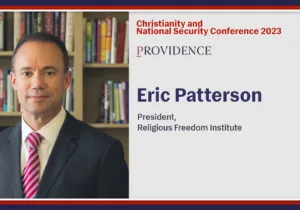The following is based on remarks delivered at the Providence launch party, Friday, November 6th. The recorded event is available on our Facebook page. For those who prefer to read, in the days ahead, we will post additional transcriptions. Watch for them!
————————————————————
In the dark days after the planes hit, the late political philosopher, public intellectual, and, importantly, grandmother, Jean Bethke Elshtain, mused to a friend that “Now we are reminded what governments for.” What she meant by this was that 9/11 made plain that the primary business of government is to provide and maintain basic security, constituted by the enduring presence of justice, order, and peace.
She believed this was a divine mandate. This didn’t mean she thought every government or public official godly, nor that any singular instance of either one is, or could ever be, entirely godly, of course not. She gestured only to idea that government is tasked with a solemn duty grounded in a divine warrant: a political ethic is necessarily an ethic of responsibility. This was one of her leit motifs. It shall be one for Providence as well.
How could it not be? From a perspective informed by faith, this notion of political responsibility shouldn’t surprise us. Those who love God are bound to love what He loves. That’s the way it goes with love. So we must love the world because history has made clear that God loves the world. If this is so, then we also know that those who love the world are bound to do what they can to care for it – to see it flourish. We know this not least because we know that God gave Christ to die for the world’s good. Following this, human beings are called to be provident – to manifest the protective care of God in history in acts of other-centered love even to the point of self-donation. This is what I take to be the message of that part of Genesis which declares, “Let us make man in our image.” How are to interpret this? I think with the simple exegetical premise that we do so by what directly follows: “Let us make man in our image…and let them have dominion over the fish of the sea, the birds of the sky, the livestock, and over all the earth.” To be made in God’s image is to exercise, as a solemn duty grounded in a divine warrant, dominion over all the earth on God’s behalf.
Naturally, we can get carried away with this. While have a responsibility in history for the conditions of history this is not to say that history depends on us, nor that our responsibility in any way approaches final or ultimate responsibility. Ours is more modest: we are to resist evil, to do no harm, to help where we can. We have a say, in how we act and how we react to other’s actions, for the conditions of life – we have a role to play. Much harm is done, the 20th Century made clear, when human beings begin to think that they have some kind of ultimate role in history, that it is in our power to eventually attain final justice, final peace, final good – rather than simply approximations of each.
Continuing this trajectory, the 20th Century ought to have convinced humanity, once and for all, that the exercise of responsible dominion sometimes carries tremendous costs. No person of good will ought to be able to consider the totalizing regimes of the 20th Century, swallowing in their genocidal hunger their dozens of millions in lime pits and crematoria fires, and remain neutral. Indeed, after a prolonged encounter with the Shoah – the holocaust – I couldn’t even remain an atheist. A part of the process of my conversion relied on that fact that the God of the bible had an answer to the problem of evil and gave me grounds – and warrant – to hate what ought to be hated and to love what ought to be loved. Moreover, Christendom provisioned moral frameworks – such as the just war tradition – that granted me a vision for what humanity can do about history and human evil.
Enter here the idea of Christian realism. Much more will be said in these pages in the days, months, and years ahead about this political theological vision. For now, I only want to indicate some of the ways this tradition will inform the character of Providence. When we invoke “Christian realism” both terms will be crucial – each informs and qualifies the other even as “realist” is the substantive noun and “Christian” the modifying adjective. First, realism here means an anti-utopian emphasis on power and interests. The realist is concerned about stability, order, and the practical means of maintain both. The realist, having pursued as accurate an accounting of the facts on the ground as possible, soberly takes the world as the world is and not as we so long for the world to be. The realist takes the bifurcated human soul in just the same way – it is what it is. But the second term, Christian, modifies the first and asserts the inclusion of a moral realism. Moral claims, the Christian realist insists, are real claims. Therefore, we need always to be loath to in any way dampen the charitable and humanitarian impulses of the human heart. They are the thumbprint of the Divine and hint at our created purpose. Because we can only be truly happy – that is truly flourish – when we live in accordance for the reasons for which were made, it is in our interests to pursue these moral claims.
The Christian realist refuses to countenance a desiccated notion of “interests” that is nothing more than a gluttonous self-obsession with hoarding our own security and material prosperity to the exclusion of concern for our assailed neighbors. In my view, the Christian realist is one for whom any nation that believes it only has responsibility for the survival of its own citizens and none what-so-ever for others is quite possibly a nation not much worthy of survival. This is a great complexity, and it is part of the work of Providence to help us navigate the tension of rightly asserting a primary moral duty to secure the justice, order, and peace of our own nation alongside accepting an ethic of responsibility that allows others to have some measure of real claim on us.
There is one more tension that needs to be mentioned in this introduction. If it is worth stopping such things as genocide than someone must do the stopping. If it is right that the government has the sword to restrain evil at home and abroad then someone needs to swing it. It has become very clear of late, in this decade-plus of constant war, that there is a moral toll to sword swinging. War has always been, and always will be, morally bruising business. But we, as a society, only make the problem worse when we fail to properly morally form our young boys and girls who will grow to be the men and women swinging their swords as they fight our wars.
One way in which this has been made clear is through the advent of our understanding of moral injury, a psychic wound that occurs when one does or allows to be done that which goes against deeply-held normative beliefs. Too many of our nation’s combat veterans deploy with the understanding that killing is wrong but in war it is necessary. It is a measure of their courage, selflessness, and neighbor-love that they are willing to do what they believe to be morally wrong – to dirty their hands – for the sake of their patriotic responsibilities and their care for those at home and those fighting on other side of them. But the problem, moral injury teaches us, is that such dirt rubs into their souls as well; and so we find troubling links between having killed in combat and veteran suicide.
This needn’t be the case. Among its core aims, Providence will rearticulate those moral resources gleaned from our Greco-Roman and Judeo-Christian patrimony that allow those at the pointy end of the spear to morally endure their vocation. The just war tradition, for instance, has much to commend on the notion that killing, like dirt, comes in different kinds. Some kinds are, indeed, morally proscribed and ought never to be done – we call this “murder”. Other kinds of killing are morally neutral because there is no one guilty for – or negligent in – having done it; we call these “accidents”. Still other kinds are, however tragic, morally permitted – such as those retributive actions intended to requite grave injustices when, in the last resort, no other means for effectively doing so are available. This isn’t to suggest that reading Providence is going to end moral injury nor that this is all there is to moral injury. It is to point to the hope to be found in a Christian tradition of thinking about the burdens of responsible statecraft in a broken world that help allow those who wield the sword to do so both effectively as well as with fidelity to biblical norms as well as to help provision our nation’s warfighters, and those individuals and institutions that morally form them, with the moral resources to assist them in prosecuting a just cause with honor, aggression, and the confidence that their pursuit of justice, order, and peace can be done without stain.
This short elucidation of several of Providence’s tasks brings us back to the beginning and I’ll end with the same personal note. This commitment to couple the conceptual with the practical was vintage Elshtain. In the course of supervising my doctoral work, she was always self-confessedly “rooted in the world” and frequently cited her grandchildren as palpable reminders that such deep and loving human relationships prove creation’s goodness and makes the endurance of basic security constituted, again I say it, by justice, order, and peace – which alone in our world allow those human relationships to flourish – worth fighting for. She insisted, by word and example, that the study of ethics must always affect the conditions on the ground – ground that sustains both our children’s play as well as the boots of our warriors.
It will be the business of Providence to continue to elucidate these goods and the conceptual commitments and practical actions necessary to maintain them, for ourselves and for others. In the days ahead, we will post more from our launch party and the inaugural print issue as well as beginning to bring in regular and occasional voices who will write on current affairs and on matters of enduring importance. You will find reflections on contemporary policy, foreign relations, national security; movie and film reviews; historical analysis; Americana; and anything else we can get our hands on that helps clarify the business of how to go about moving in the morally bruising world without becoming irreparably morally bruised.
Meanwhile, I commend Providence – in print on digitally – to your attention and to your close reading. We invite you, all people of good will, into this community to help us build a central place for those committed to serious rumination on issues of the state, Christian responsibility specifically and moral obligation more generally, love in international relations, coercive power, war, the question of evil, and the whole range of other issues that perpetually accompany life together in a broken world.
Marc LiVecche is the managing editor of Providence and Scholar on Christian Ethics, War, & Peace at the Institute on Religion and Democracy







 Live in the DC area? Sign-up for Providence's in-person events list!
Live in the DC area? Sign-up for Providence's in-person events list!